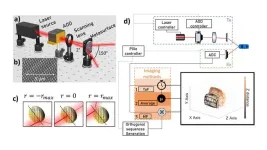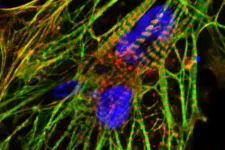(Press-News.org) A new study published in CABI Reviews suggests that the impact of climate change on animals will be “multi-faceted” with “cascading effects” across five welfare domains including nutrition, environment, behaviour, physical and mental health.
The research, highlights how researchers need to carefully consider which domains are immediate and future priority to safeguard the welfare and longevity of animals for food, as domestic pets and those for conservation in nature reserves and zoos.
Animals at risk from the impacts of climate change highlighted in the review include bats, zebrafish, stony creek frogs, koalas, African elephants, chickens and dairy cows.
It is argued in the review that although there are variations in how animals respond biologically to stress, in general, the five domains model provides a robust tool for research use, and to evaluate the proximate effects of climatic variability on animals.
The study provides a broad overview of the impacts of climate change in animal welfare, drawing on examples from various animal groups across terrestrial and aquatic habitats, encompassing both wildlife and domesticated species.
Dr Edward Narayan, lead author and Senior Lecturer of Animal Science in the School of Agriculture and Food Science at The University of Queensland, Australia, said, “While researchers have extensively examined the effects of climate change on animals, the direct correlation between climate change and animal welfare, particularly in the context of wild animals, remains relatively scarce in existing studies.
“In this review, our research group – The Stress Lab – presents a series of wildlife and domesticated animals examples from various countries, across both aquatic and terrestrial systems and provide an overview of the impacts of climate change on each of the five domains of animal welfare.
“We hope that future researchers will apply the animal welfare domains to evaluate how climate change impacts on animals, and further research will pave the way to the protection of animals from the catastrophic impacts of climate change.”
The review highlights research that shows how heat stress, for example, in dairy cows has resulted in a 35% reduction in milk production. Heat stress significantly impacts lactation performance, immune function, and calf health.
However, monitoring cows' activity and rumination time helps detect heat stress, and appropriate heat dissipation strategies such as sunshades and sprinklers can mitigate its effects, the researchers suggest.
It also argues that broiler chickens kept under hot conditions for four days showed higher cases of necrosis – reducing quality of their life and meat. The welfare of birds, especially mature broilers, under warmer conditions is of great concern.
Birds have a limited capacity for heat regulation as they lack sweat glands, and regulate temperature by panting, limiting their activity and drinking more. Accordingly, air conditioning units may be required to maintain an optimal production temperature.
Drought and scarcity of resources are also key contributors to the death of elephants, the scientists highlight. They argue that as the largest extant terrestrial mammal, the African elephant has significant daily food and water needs.
But as droughts become more frequent and predictable, the availability of water and vegetation cover declines, increasing elephant heat and nutrition stress, contributing to the elevated elephant mortality currently being witnessed.
The study also stresses that climate change has been recognised as a major factor in driving population decline across many species of marsupial, including the koala.
Increasing mean temperatures mean species such as the koala will be required to expend more energy to maintain body temperature, using a food source that is reduced in quality due to current climate change projections.
And even the domestic cat and dog is affected by climate change, according to the scientists. They say, for instance, that certain breeds of dog are susceptible to heat stroke while heat-related diseases are a leading cause of death in military working dogs.
Around half of all dogs in the UK are overweight with insufficient exercise being a factor and weather conditions can be a potential hindrance to dog walking. The review highlights that 87% of owners report that they exercise their dogs less during hot weather. The gradual increase in global temperature has the potential to decline the level of welfare for dogs which, the scientists say, may also lead to changes in the role of dogs in human society.
Dr Narayan added, “As climate change drives more wild populations to ecological limitations, there will be potential welfare consequences and considerations to explore; for example, when vulnerable species would need to be transferred to new environments (e.g., captive breeding), should food and habitat become limiting resources.
“Likewise, production animals and other domesticated species will be impacted by the extreme environmental changes with consequences on each of the dimensions within the five domains of animal welfare.”
Additional information
Main image: With incidents of increased drought and higher temperatures caused by climate change, elephants will have to find other way to regulate their body temperatures while also meeting their water and nutritional needs with reduced access to water and foliage (Credit: Pixabay).
Full paper reference
Joseph, Joe; Charalambous, Renae; Pahuja, Harsh; Fox, Dylan; Jeon, Jiwoo; Ko, Ning-Yuan; Rao, Nishit; Wang, Zhiheng; Nerurkar, Sneh; Sherekar, Sharvari; Yang, Yifei; Dutton-Regester, Kate; Narayan, Edward, ‘Impacts of climate change on animal welfare,’ CABI Reviews, 21 July (2023). DOI: 10.1079/cabireviews.2023.0020
The paper can be read open access from 00:01hrs UK time 21 July, 2023, here: https://www.cabidigitallibrary.org/doi/10.1079/cabireviews.2023.0020
Media enquiries
For more information and an advance copy of the paper contact:
Dr Edward Narayan, Senior Lecturer, The University of Queensland, Australia – email: e.narayan@uq.edu.au
Wayne Coles, Senior PR Manager, CABI – email: w.coles@cabi.org
About CABI Reviews
CABI Reviews is a reviews journal covering agriculture, global health, nutrition, natural resources and veterinary science.
About CABI
CABI is an international not-for-profit organization that improves people’s lives by providing information and applying scientific expertise to solve problems in agriculture and the environment.
Through knowledge sharing and science, CABI helps address issues of global concern such as improving global food security and safeguarding the environment. We do this by helping farmers grow more and lose less of what they produce, combating threats to agriculture and the environment from pests and diseases, protecting biodiversity from invasive species, and improving access to agricultural and environmental scientific knowledge. Our 49-member countries guide and influence our core areas of work, which include development and research projects, scientific publishing and microbial services.
We gratefully acknowledge the core financial support from our member countries (and lead agencies) including the United Kingdom (Foreign, Commonwealth and Development Office), China (Chinese Ministry of Agriculture and Rural Affairs), Australia (Australian Centre for International Agricultural Research), Canada (Agriculture and Agri-Food Canada), Netherlands (Directorate-General for International Cooperation, and Switzerland (Swiss Agency for Development and Cooperation). Other sources of funding include programme/project funding from development agencies, the fees paid by our member countries and profits from our publishing activities which enable CABI to support rural development and scientific research around the world.
END
Impacts of climate change on animals will be “multi-faceted,” study in CABI Reviews reveals
A new study published in CABI Reviews suggests that the impact of climate change on animals will be “multi-faceted” with “cascading effects” across five welfare domains including nutrition, environment, behaviour, physical and mental health.
2023-07-21
ELSE PRESS RELEASES FROM THIS DATE:
Center for Open Science welcomes Yvette Seger to its Board of Directors
2023-07-20
Charlottesville, VA –The Center for Open Science (COS) is delighted to announce the appointment of Yvette Seger, PhD to its Board of Directors. Seger brings impressive experience and strategic leadership across a range of areas that aligns well with COS’s mission, vision, and activities, including policy analysis, advocacy, and implementation.
Seger holds multiple roles as Director of Science Policy, Deputy Director of the Office of Public Affairs, and Director of Strategic Scientific Program ...
Fueled by new chemistry, algorithm mines fungi for useful molecules
2023-07-20
A newly described type of chemistry in fungi is both surprisingly common and likely to involve highly reactive enzymes, two traits that make the genes involved useful signposts pointing to a potential treasure trove of biological compounds with medical and chemical applications.
It was also nearly invisible to scientists until now.
In the last 15 years, the hunt for molecules from living organisms — many with promise as drugs, antimicrobial agents, chemical catalysts and even food additives — has relied on computer algorithms trained to search the DNA of bacteria, ...
Streets recognized by CMS as legitimate locale to deliver health care
2023-07-20
The Centers for Medicare and Medicaid Services (CMS) officially recognized that medical care can be delivered on the street, making it possible for providers like USC’s Street Medicine team to be reimbursed for services provided to people who are currently unhoused.
The decision, which was announced on June 28, 2023, was the result of a multi-year effort on the part of leaders of USC Street Medicine and the Street Medicine Institute to have CMS create a place of service (POS) code for the street. As a result of this designation, street medicine providers nationwide will be able ...
Can prehabilitation improve inflammatory biomarkers in American Indian cancer patients?
2023-07-20
A University of Arizona Cancer Center researcher was awarded a $1.3 million grant from the National Cancer Institute to study the effectiveness of lifestyle interventions in American Indian patients with obesity-related solid tumor cancers who are preparing for surgery.
According to principal investigator Jennifer Erdrich, MD, MPH, there are 13 cancer subtypes linked to obesity that account for 40% of all cancers diagnosed annually in the United States.
American Indian and Alaska Native populations are more than 1.5 times more likely to be obese than the general population and have some of the lowest cancer survival rates in the nation. Many factors ...
Hardship affects the gut microbiome across generations
2023-07-20
Key takeaways
A UCLA-led study has shown that hardship experienced by mothers during their own childhood or during pregnancy is reflected in the composition of their 2-year-old children’s gut microbiome.
It was previously understood that in rodents, prenatal stress affects microbiomes into adulthood, but how long after birth the effects lasted in humans was unknown.
The changes to this community of microorganisms are likely among the ways that hardship affects a child’s socioemotional development.
Hardship experienced by mothers during their own childhood or during pregnancy is reflected ...
Department of Energy releases draft request for proposals for the Fermi National Accelerator Laboratory Management and Operating Contract Competition
2023-07-20
Today, the U.S. Department of Energy (DOE) announced the release of a Draft Request for Proposals (RFP) for the selection of a management and operating (M&O) contractor for the Fermi National Accelerator Laboratory (FNAL).
DOE is soliciting public feedback on the draft RFP. Interested parties are encouraged to take advantage of this opportunity to provide comments regarding the draft contract performance requirements. The draft RFP will be open for public comment until August ...
WFSJ presents WCSJ2025 and WCSJ2027!
2023-07-20
“It’s a great privilege to host the World Conference of Science Journalists 2025,” says Mandi Smallhorne, president of SASJA. “As it is the first time the conference has ever been held on African soil, this is truly a historic event, we’re delighted to be the pioneers! We look forward to welcoming the science journalists of the world to our home; we are sure it will be an eye-opening and rewarding experience. Our beautiful country has a lot to share, and that includes some fascinating scientific experiences, from the Square Kilometre Array, to cutting edge genomic sequencing, to the Cradle of Humankind. We are brewing ...
Wide field-of-view metasurface-enhanced scanning lidar technology
2023-07-20
Pulsed laser scanning lidar is a core technology for autonomous driving and robotic mobility. Herein, a directional light pulse is backscattered by a reflective object and the elapsed time between emission and detection of the pulse is used to calculate depth. These direct time-of-flight (d-ToF) measurements of returning light pulses enable the three-dimensional imaging of complex scenes.
At present, lidar technology requires numerous developments, including enhancement of the observation field of view (FoV) with high angular resolution, improvement of the imaging frame rate, extension of the ambiguity range by reducing the signal-to-noise ...
Powerhouse proteins protect heart cells from chemotherapy damage
2023-07-20
Researchers at the University of Illinois Chicago have identified a process by which enzymes can help prevent heart damage in chemotherapy patients.
The enzymes are normally found in a cell’s mitochondria, the powerhouse that produces energy. But when heart cells are put under stress from certain types of chemotherapy drugs, the enzymes move into the cell’s nucleus, where they are able to keep the cells alive. The paper is published in Nature Communications.
“As chemotherapy has become more and more effective, we have more and more cancer survivors. But the tragic ...
New theory better explains how the brain stores memories
2023-07-20
How useful a memory is for future situations determines where it resides in the brain, according to a new theory proposed by researchers at HHMI"s Janelia Research Campus and collaborators at UCL.
The theory offers a new way of understanding systems consolidation, a process that transfers certain memories from the hippocampus – where they are initially stored – to the neocortex -- where they reside long term.
Under the classical view of systems consolidation, all memories move from the hippocampus to the neocortex over time. But this view doesn’t always hold up; research shows some memories permanently reside ...
LAST 30 PRESS RELEASES:
Hairdressers could be a secret weapon in tackling climate change, new research finds
Genetic risk for mental illness is far less disorder-specific than clinicians have assumed, massive Swedish study reveals
A therapeutic target that would curb the spread of coronaviruses has been identified
Modern twist on wildfire management methods found also to have a bonus feature that protects water supplies
AI enables defect-aware prediction of metal 3D-printed part quality
Miniscule fossil discovery reveals fresh clues into the evolution of the earliest-known relative of all primates
World Water Day 2026: Applied Microbiology International to hold Gender Equality and Water webinar
The unprecedented transformation in energy: The Third Energy Revolution toward carbon neutrality
Building on the far side: AI analysis suggests sturdier foundation for future lunar bases
Far-field superresolution imaging via k-space superoscillation
10 Years, 70% shift: Wastewater upgrades quietly transform river microbiomes
Why does chronic back pain make everyday sounds feel harsher? Brain imaging study points to a treatable cause
Video messaging effectiveness depends on quality of streaming experience, research shows
Introducing the “bloom” cycle, or why plants are not stupid
The Lancet Oncology: Breast cancer remains the most common cancer among women worldwide, with annual cases expected to reach over 3.5 million by 2050
Improve education and transitional support for autistic people to prevent death by suicide, say experts
GLP-1 drugs like Ozempic could cut risk of major heart complications after heart attack, study finds
Study finds Earth may have twice as many vertebrate species as previously thought
NYU Langone orthopedic surgeons present latest clinical findings and research at AAOS 2026
New journal highlights how artificial intelligence can help solve global environmental crises
Study identifies three diverging global AI pathways shaping the future of technology and governance
Machine learning advances non targeted detection of environmental pollutants
ACP advises all adults 75 or older get a protein subunit RSV vaccine
New study finds earliest evidence of big land predators hunting plant-eaters
Newer groundwater associated with higher risk of Parkinson’s disease
New study identifies growth hormone receptor as possible target to improve lung cancer treatment
Routine helps children adjust to school, but harsh parenting may undo benefits
IEEE honors Pitt’s Fang Peng with medal in power engineering
SwRI and the NPSS Consortium release new version of NPSS® software with improved functionality
Study identifies molecular cause of taste loss after COVID
[Press-News.org] Impacts of climate change on animals will be “multi-faceted,” study in CABI Reviews revealsA new study published in CABI Reviews suggests that the impact of climate change on animals will be “multi-faceted” with “cascading effects” across five welfare domains including nutrition, environment, behaviour, physical and mental health.



